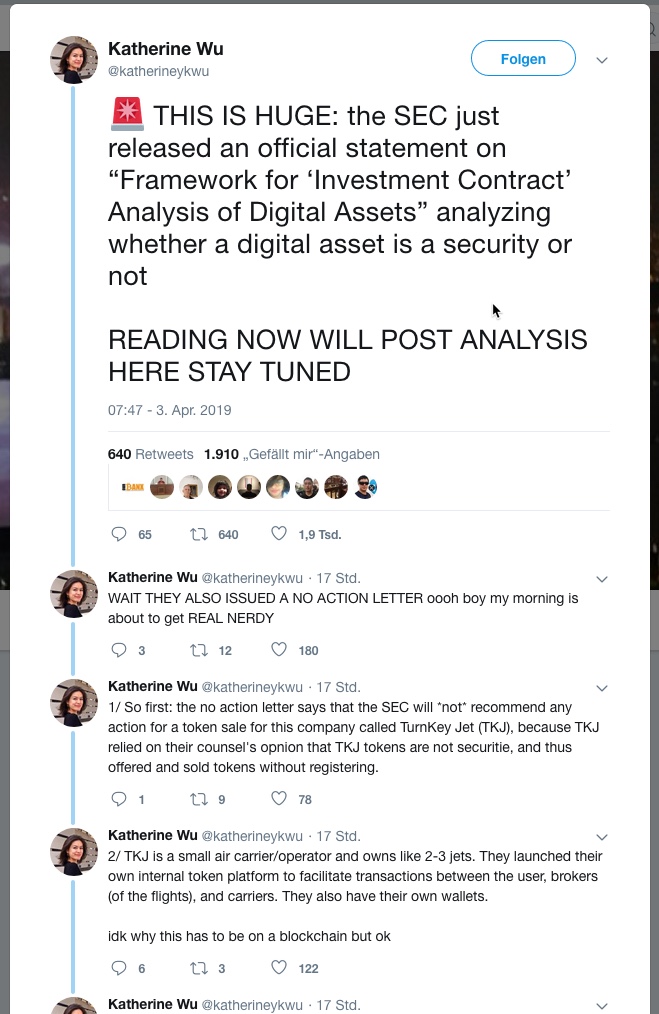Es hat ein wenig gedauert, bis das Bundesfinanzministerium das Urteil des Europäischen Gerichtshofs zur bundesdeutschen Tatsache gemacht hat. Aber nun ist es soweit. Sorgen, dass es irgendwie doch noch zu einer Verumsatzsteuerung von Bitcoin-Verkäufen kommt, haben sich damit endgültig erledigt.
Nachdem wir vor etwa zwei Wochen die Meldung hatten, dass das Finanzamt Bonn-Innenstadt versucht, von einem Bitcoin-Unternehmer die Umsatzsteuer für den Verkauf von Bitcoin zu verlangen, hat dies für ein gewisses Entsetzen in der Szene gesorgt. Unbestätigten Berichten zufolge hat dies zu Schlaflosigkeit unter Bitcoin-Tradern geführt und in einem extremen Fall sogar eine Psychose ausgelös. Manch ein Trader begann, sich wegen der potenziell hohen Umsatzsteuernachforderung um seine wirtschaftsliche Existenz zu fürchten. Mit ausgelöst wurde die Unruhe etwa durch Berichte des Steuerberaters Rüdiger Quermann sowie des Rechtsanwalts István Cocron.
Experten wie der Steuerberater Diplom-Kaufmann Christian Densch aus Essen, der als „Kryptotaxpert“ Gastgeber einer beliebten Facebook-Gruppe ist, haben von Anfang an energisch darauf hingewiesen, dass hier unnötig Panik verbreitet wird. Die Forderungen des Finanzamtes Bonn-Innenstadt seien in keinster Weise zu halten. Sie seien auch kein Ausfluss einer wie auch immer gearteten Verschwörung der Finanzämter, die nun versuchten, Bitcoin kaputt zu machen und die Bitcoin-Trader zu ruinieren, sondern lediglich das Ergebnis einer gewissen Trägheit der Behörden. Es sei weder notwendig, sich Sorgen zu machen, noch angebracht, Ängste zu schüren oder gar das persönliche Armageddon zu verkünden.
Wie sich bald darauf zeigte, hat der Steuerberater Christian Densch recht. Ihm gelang es im persönlichen Gespräch und einem darauf folgenden E-Mail-Verkehr, eine zur Veröffentlichung freigegebene Einschätzung von Dr. Christian Hufen zu bekommen. Dr. Hufen ist Persönlicher Referent des Parlamentarischen Staatssekretärs des Bundesministeriums für Finanzen, Dr. Michael Meister. Er schreibt, dass sich Kryptotaxperts „Vermutung, dass der Umtausch von Bitcoins in andere Währungen unter eine Umsatzsteuerbefreiung fällt, bestätigt“ hat. Es gilt die Entscheidung des Europäischen Gerichtshofes im Fall Hedqvist. „Danach handelt es sich bei dem Umtausch konventioneller (gesetzlicher) Währungen in Einheiten der virtuellen Währung ‚Bitcoin‘ und umgekehrt um eine Dienstleistung gegen Entgelt, die unter die Steuerbefreiung nach Art. 135 Abs. 1 Buchst. e der Richtlinie 2006/112/EG des Rates vom 28. November 2006 (sog. EU-Mehrwertsteuer-Systemrichtlinie, MwStSystRL) fällt.“
Der Steuerberater Densch hat noch einige weitere Fragen gestellt – etwa zum Mining oder zur steuerlichen Handhabung von Zahlungen mit Bitcoin – auf die der Persönliche Referent interessante, und im großen und ganzen auch erfreuliche Antworten gibt. Aber dazu ein andermal mehr. Hier sollte man feststellen, dass das Thema der Umsatzsteuer für den Verkauf von Bitcoins vom Tisch war.
Ein Schreiben des Bundesfinanzministeriums an die obersten Finanzbehörden der Länder vom 27. Februar, das auf der Webseite des Ministeriums veröffentlicht ist, bestätigt nun auch gegenüber den Behörden die Anwendung des Urteils des EuGH und bestätigt den Inhalt der E-Mail, die “Kryptotaxpert” bereits am 21.02.2018 auf seiner Seite veröffentlicht hat. Beim Umtausch von Bitcoin in Euro handelt es sich um eine „steuerbare sonstige Leistung, die im Rahmen einer richtlinienkonformen Gesetzesauslegung nach § 4 Nr. 8 Buchst. b UStG umsatzsteuerfrei ist.“ Die Grundsätze dieser Anordnung seien in allen offenen Fällen anzuwenden. Wer also sich noch irgendwie von der Umsatzsteuer bedroht fühlt, kann nun offiziell aufatmen.
Warum aber hat das Bonner Finanzamt nun trotz all dem einen Umsatzsteuerbescheid erlassen? Die Antwort darauf dürfte einen interessanten Einblick darin geben, wie deutsche Behörden zu arbeiten verpflichtet sind. Die Hauptsachgebietsleiterin Betriebsprüfung und Gewerbesteuer beim Finanzamt Bonn-Innenstadt verwies im Rahmen eines Telefonats mit Herrn Densch darauf, dass ohne Anwendungsschreiben der vorgesetzten Behörde ein EuGH Urteil nicht unmittelbar durch das Finanzamt umgesetzt werden darf. Unglücklicherweise orientierte sich die Verwaltungsmeinung noch an der Auffassung des BMF die Umsätze mit Bitcoin unterliegen der Umsatzsteuer. Das Finanzamt Bonn-Innenstadt hatte somit keine andere Wahl, als den mißliebigen Bescheid zu erlassen, auch wenn es sich selbst im klaren war, dass dieser nicht rechtens sein kann.
Es wäre interessant, wenn sich der Betroffene auch einmal zu Wort melden würde, bei der Aufregung, die um dieses Thema erzeugt wurde, dürfte ihm das ja nicht entgangen sein.
Source: https://bitcoinblog.de



